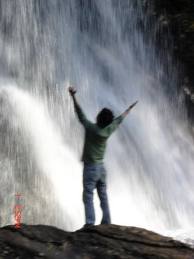Matthew 3:13-17 (Baptism A)
13Then Jesus came from Galilee to John at the Jordan, to be baptized by him. 14John would have prevented him, saying, “I need to be baptized by you, and do you come to me?” 15But Jesus answered him, “Let it be so now; for it is proper for us in this way to fulfill all righteousness.” Then he consented. 16And when Jesus had been baptized, just as he came up from the water, suddenly the heavens were opened to him and he saw the Spirit of God descending like a dove and alighting on him. 17And a voice from heaven said, “This is my Son, the Beloved, with whom I am well pleased.”
This Sunday is Baptism of Christ Sunday. On this Sunday every year, the Sunday following Epiphany Sunday, we remember Jesus’ Baptism. We also remember our own since the two are inextricably wound together. And many of your pastors will celebrate by tossing water at you. I always loved tossing water. It’s playful and I think worship should always have some remnant of play. But, more than that, it’s joyful.
The reading begins simply: “Then…” It is such a common connector, that we probably sort of gloss over it. But look a little more closely. It wasn’t just the thirty years that Jesus had waited to commit to public ministry. It was the centuries upon centuries and ages upon ages that all of Creation had waited for the dawn to break. In essence, from that very moment when we are told in the first chapter of Genesis that God’s Spirit swept over the face of the waters, Creation has been groaning and straining for this very moment, the very moment when life would emerge from the water.
Thirty years was, in fact, the traditional time that a rabbi waited to be committed to God. In those thirty years, Jesus would have been caring for his mother, and making a living, and preparing himself for ministry. I don’t really think that, contrary to what some may say, Jesus was confused about these roles. He was always serving God. But now…then…the time had come. And as eternity dawns, Jesus is ready to begin. And so, he goes to John at the Jordan to be baptized and for a very short amount of time was then actually a disciple, a follower, of John’s.
Because Jesus was from Nazareth, he would have had to make a trip of about 70 miles in order to arrive at the Jordan. This was in some sense a sort of “mini-pilgrimage”, an intentional journey to be baptized by John. Now, according to the Matthean version of the Gospel, John knew who Jesus was. So, you can imagine, how uncomfortable he might have been at actually baptizing Jesus, at actually accepting this Son of God as part of his following. But Jesus reassures John. “Let it be so now.” Now is the time. It is now. “And,” asserts Jesus, “this is the way to fulfill all righteousness.” This is the way to fulfill the will of God. At this moment, in an odd twist of events, Jesus and John become partners in carrying out God’s plan for salvation. And so, just as each of us received the gift of water in our own Baptism, Jesus kneels in the Jordan and John bends over him and baptizes him. And from the water, the work has begun.
From the water, the heavens are opened and the Spirit emerges. And we hear what all the world has always been straining to hear: “This is my Son, the Beloved, with whom I am well pleased.” Even though the writer of the Gospel has presented Jesus as the Son of God in the birth story, it is not until this moment that the title is actually conferred. From the water, comes Jesus Christ as Savior and Redeemer of all of Creation. From the water, comes life.
So, with this story, we consider our own baptism. I don’t remember mine. I was about 7 months old. But I know it happened. And, see, “remembering” your baptism is not merely a recounting of some hazy memory; it is rather remember who you are, remembering that from those waters came life. It is not as important for us to remember the day of our baptism as it is that we remember that we were, that we or someone on our behalf affirmed who we were—a daughter or son of God, the Beloved, with whom God is well pleased. That’s what it’s about. Our baptism is not our becoming. We were already there. God had already imprinted blueprints of who we would be deep into our being. Our baptism is when we begin that long and somewhat arduous journey of joining with God in living into who we are.
Caroline Westerhoff says that “at baptism we are incorporated into Christ’s body, infused with Christ’s character, and empowered to be Christ’s presence in the world. [And then], ministry is not something in particular that we do; it is what we are about in everything we do.”[i] In other words, our own Baptism sweeps us into that dawn that Jesus began.
Jesus was still wet with water after John had baptized him when he stood to enter his ministry in full submission to God. As he stood in the Jordan and the heavens spilled into the earth, all of humanity stood with him. We now stand, wet with those same waters, as we, too, are called into ministry in the name of Christ. As we emerge, we feel a cool refreshing breeze of new life. Breathe in. It will be you always. Something has happened. Maybe we can’t explain it; maybe we don’t even understand it; but in the midst of the noisiness of life, in the midst of things that we don’t think can lend to our spiritual walk at all, in the midst of everything we know and everything we don’t, God takes ordinary, everyday water, wet, cold, nothing special and from the water, we emerge with new life.
Brothers and sisters in Christ: through the sacrament of baptism we are initiated into Christ’s holy church. We are incorporated into God’s mighty acts of salvation and given new birth through water and the Spirit. All this is God’s gift, offered to us without price.
Remember your Baptism and be thankful…
The future enters into us, in order to transform itself in us, long before it happens. (Rainer Maria Rilke)
Grace and Peace,
Shelli
[i] Caroline A. Westerhoff, Calling: A Song for the Baptized, (Cambridge, MA: Cowley Publications, 1994), xi.




 13Then Jesus came from Galilee to John at the Jordan, to be baptized by him. 14John would have prevented him, saying, “I need to be baptized by you, and do you come to me?” 15But Jesus answered him, “Let it be so now; for it is proper for us in this way to fulfill all righteousness.” Then he consented. 16And when Jesus had been baptized, just as he came up from the water, suddenly the heavens were opened to him and he saw the Spirit of God descending like a dove and alighting on him. 17And a voice from heaven said, “This is my Son, the Beloved, with whom I am well pleased.” (Matthew 17: 1-9)
13Then Jesus came from Galilee to John at the Jordan, to be baptized by him. 14John would have prevented him, saying, “I need to be baptized by you, and do you come to me?” 15But Jesus answered him, “Let it be so now; for it is proper for us in this way to fulfill all righteousness.” Then he consented. 16And when Jesus had been baptized, just as he came up from the water, suddenly the heavens were opened to him and he saw the Spirit of God descending like a dove and alighting on him. 17And a voice from heaven said, “This is my Son, the Beloved, with whom I am well pleased.” (Matthew 17: 1-9)
